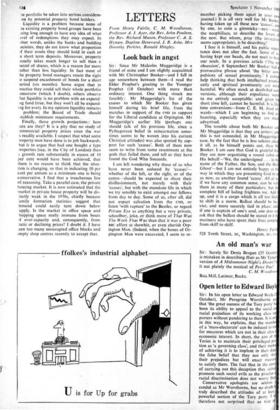LETTERS
From Henry Fairlie, C. M. Woodhouse, Professor A. I. Ayer, the Rev. John Poulton, the Rev. Richard Mason, Professor C. A. S. Hynam, Daphne Hereward, I. B. Ashe, Mrs Dorothy Perkins, Ronald Hingley.
Look back in angst
Sir: Since Mr Malcolm Muggeridge is a friend of mine and I am slightly acquainted with Mr Christopher Booker—and I fall in age somewhere between them—I read the Elder Prophet's greeting to the Younger Prophet (18 October) with more than ordinary interest. One thing struck me forcibly : Mr Muggeridge's list of the causes to which Mr Booker has given himself during his brief life, from the marches in support of the CND to support for the Liberal candidate at Orpington. Mr Muggeridge's earlier life (perhaps one should talk of his previous life, since a Pythagorean belief in reincarnation some- times seems to be woven into his current Christian attitudes) was also spotted by sup- port for such 'causes'. Both of them now seem to write from some resentment at the gods that failed them, and tell us they have found the God Who Succeeds.
I am left wondering why those of us who have never been seduced by 'causes'— whether of the left, or the right, or of the centre—should be expected to share their disillusionment, not merely with their 'causes', but with the mundane life in which we try sensibly to exist amongst our fellows from day to day. Some of us, after all, did not expect salvation from the CND, or listen 'with rapture' to the Beatles, or regard Private Eye as anything but a very private, schoolboy, joke, or think more of That Wai The Week That Was than that it was a poor BBC effort at showbiz, or even cherish Orp- ington Man. (Indeed, when the bones of Or- pington Man were excavated, I seem to re- member picking them apart in your oNk journal.) It is all very well for Mr Booker having taken up all these new 'causes', o by one, to coin a gimmicky—new-0 the neophiliacs, to describe the lovers o the new. But whom, pray (the invocatio seems appropriate), is he describing?
I fear it is himself, and his public repen lance does not alter the fact. Some of having kept kept our heads, do not need to ba our souls. In a previous article (`The se obsession', 6 September) Mr Booker had provocative phrase about 'the bitter co pulsions a sexual promiscuity.' I cann help thinking that both intellectual prom cuity and spiritual promiscuity are mo harmful. We often mock at death-bed con versions, although their expedience se to me entirely acceptable; and given short time left, cannot be harmful. It is lif time conversions—from C. E. M. load o wards—which I am beginning to find en hausting, especially when they are mile advertised.
The trouble about both Mr Booker an Mr Muggeridge is that they are joiners; a this is not concealed, in Mr Muggeridge case, by the fact that he is less solemn abo it all, as he himself points out, than M Booker. I am sure that God is grateful t they are now organising a round robin His behalf—'We, the undersigned. . . in t name of the Father, the Son, and the Ho Ghost'—but I am not entirely happy at t way in which they are presenting God to as new, as another found 'cause'. All of u if we have any common sense, can be vat them in many of their particulars; but t complete bill of lading frightens me. Add• up, and it is a cargo which is all too like to shift in a storm. Ballast should be hea vier, and more securely tied in place; an if one is captain of one's soul, one does n ask that the ballast should be stored in it b mariners who have spent their lives jumpin from skiff to skiff.
Henry Fair
528 Tenth Street, SE, Washington, DC, us














































 Previous page
Previous page